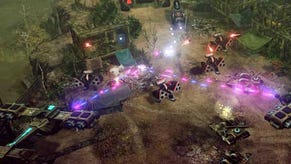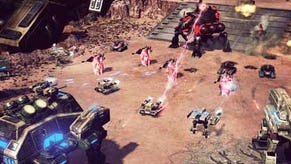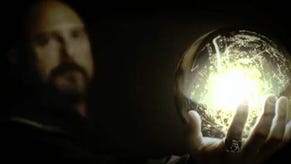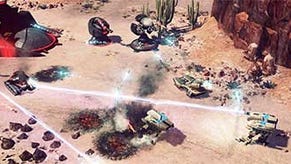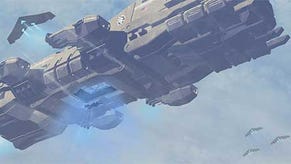Tiberium Loremaster: C&C4's Samuel Bass
Command & Conquer 4 arrives this week to the tutting of sceptics. The new game is different: no base-building, no economy. It's also the end of the Tiberium saga. What does it all mean? The man responsible for concluding Kane is Samuel Bass, and last night we spoke to him about the end of the Tiberium saga, experimental RTSs, the value of the PC, King's Bounty, and the dreaded DRM. Read on for international interview interest.
RPS: Hello, Mr Bass. Can you start off by explaining yourself, and describing what your job entails?
Bass: I'm one of the lead designers on C&C4, and we have a couple. I was the campaign and story lead, I'm also the loremaster of the Tiberium universe, so I manage the fiction. But I was involved in pretty much every aspect of the game. I've been involved with EA for seven years and joined the RTS group with Battle For Middle Earth 2, I've worked on C&C3, Red Alert 3, and C&C4.
RPS: Can you explain how you ended up making C&C4? How did the project come to be?
Bass: Well, this was a little unusual. Normally a game is proposed by the main design team, they have a specific vision for what they want to do and then they work it through to completion, but C&C4 started off as a weird little skunkworks project, where we had a couple of our designers off in a corner experimenting with RTSes and trying to come up with ways to broaden the appear of the genre. They were playing around with how to change the standard model of destroying the other guy's base, looking at how you might change the win/lose conditions... And at that time I was the lead on Kane's Wrath, doing something quite traditional, and quite the opposite of where C&C4 would go. I joined the C&C4 project about a year and half ago, at which point the team had a design, with the basic tenets of the game including player progression and class system, the basic elements of the game. My job was to come on board and give it structure and narrative context.
Then the task was to refine this to make it into something we felt comfortable with putting out to the public. These skunkworks projects aren't too dissimilar to making a mod, so you might have something fun but there's a lot of work to do before you get to a finished game. So... I wrote the story, produced, ran the live-action FMV, which is really fun.
In short, I go to a lot of meetings.

RPS: Why don't we actually find out the secret origin of Kane in C&C4? Weren't we promised that all would be revealed?
Bass: Well yeah, interesting story. There was a big debate about how much of the Kane backstory to reveal, and part of the issue there was that the backstory have never very consistent. We spent a lot of time investigating it, talking to Westwood and so on, but there was never any consistency. We put a lot of stuff on the table, but we don't say "Oh he's the brother of Abel", or do any of those Biblical origins ideas, which I really wanted to do. Let's just say that there was a desire /not/ to do that for this game. Additionally, the C&C community is very hardcore - it's been around since the start of the internet! - so I have tried to work to meet their expectations of the game, and the lore. It was a thorny one.
RPS: Is this actually the end of the Tiberium arc then?
Bass: Yes, it's the end. The universe could continue, so if EA Hungary want to do another game in ten years time, they could do that. But this is very definitely the end of the Tiberium story. Any new C&C game would definitely need a new story.
RPS: And whose idea was that? Who ended Kane?
Bass: Well, EA wanted another C&C, so as good employees we said "no, problem" and gave them one. But ending the story came from me. I didn't want to keep wheeling out Kane every two years and saying "Look, Kane! You like Kane! It's C&C 2010!" There was no reason to do another game that was just another instalment of C&C3. Ending the story made sense, and I think the mechanical changes in the game set up the ending of the story. So there was some convergence there.
RPS: But why the different RTS model? Why do away with base-building in the first place? Isn't that the point of C&C?
Bass: Well, some of the motivation came from the fact that we had a very small online multiplayer population. We started thinking "what can we do to get more players online together, playing these games?" All those players do is play a bit of single player and then they're done - how can we get them online?
We had to make a model that didn't cater solely for hardcore players, we wanted to cater for a range of different styles and play, which is why we went to the battlefield style of play. Gaining tickets and capturing areas is fairer because you aren't just wiping people out completely. We've taken a lot of inspiration from the Battlefield games in that sense. The other thing was, well, I am nicknamed "The Turtle" because I am absolutely the turtling RTS player, and I like to hang back and build the huge army. That's been becoming increasingly less viable in recent games, so we wanted to recreate that. We wanted to make that kind of play possible by allowing people lock down areas of the map. This led to the support class, which is the weirdest class we've done, in that it's primarily air vehicles and support powers. Those things have fallen by the wayside a little, so we doubled up on it with C&C4. And I think that class allows a player who isn't so familiar with this kind of game to come in and enjoy himself. He can enter a frantic 5v5 and really contribute something. That's one of the reasons the beta playtest was started so early, so we could try and get that sort of thing right, and to see if all these classes would mesh together. I think they have.
Also, some stuff just came out of our prototyping. For example, the game doesn't have an economy! We had an economy for the longest time, and then we just started to notice that no one ever really noticed that they had an economy, because there wasn't a harvester on screen. It was just a number on a ticker, really, so why not turn it off? Why add a number you don't need? We turned it off and no one noticed. Similar decisions were motivated by work on other titles. For example, Red Alert 3 could be relatively hardcore in that if you rolled out with a huge army and it was the /wrong/ huge army you could get crushed. We went for lower lethality this time. Even if you roll out with the wrong army here you can still feel like you are having an impact on the battlefield. It just lets a few more people in.
RPS: So you agree with the idea that the RTS needs to diversify to survive? Do you think the RTS will evolve into a more varied set of games?
Bass: I hope so. That's my personal hope for the genre. It's interesting because I am really enjoying Starcraft 2 - I'm crap at it and still playing - and I hope it sells a gazillion copies. But I think we need to not /just/ do that kind of game. We need to be doing other things: Dawn Of War 2 was a really brave stab in a new direction. Dawn of Chaos is haunting me, I must buy it online... anyway, we have to avoid turning into the flight sim genre, small but very hardcore. We just want to bring more people in. We were so sad to see Ensemble go... it shows a lack of publisher confidence, I think, because they don't feel the genre has a capacity to grow and adapt. Whether or not people consider C&C4 a success or not, it's a hopeful game.

RPS: Is part of this the difficulty in bringing traditional PC-based strategies to new audiences? And by new I mean console audiences?
Bass: We've taken a stab at it over the last few years - C&C4 is PC-only - we've done console version of our games, and we were still essentially PC developers. How much accommodation do you make for the console version of the game? Do we hurt the PC produce to make the console one better? I don't think so. RTS games still present these problems. For example, when Halo, or even GoldenEye, came out people argued that you couldn't play a shooter properly without a mouse and keyboard. Well, that difficulty pales in comparison to getting an RTS interface to work on a console. You can do it, and we've been making steps towards it, but you need you build from the ground up for the console. And get a bit lucky. I mean, look at Brutal Legend, the game was an RTS from the start, but those were the hardest bits of the game to get through. You end up with some crab-claw hand, pinching four buttons at once.
But I should stress that I don't think PC gaming is going away, that was a false perception created by the drop in retail sales and the obviousness of piracy. PC gaming is coming back in a new form, moving online. Everyone's getting in on it, EA has its own store now. I already prefer buying a game online to going and buying in a shop. And the PC is just so exciting, because you're able do more experimental stuff without the influence of Sony or Microsoft, but more importantly because the audience is more willing to take risks. And we're seeing revivals in old genres - look at the way Eastern European and Russian developers are bringing fun stuff to the table. I've been playing stupid amounts of King's Bounty: Armoured Princess, which is awesome. And funny, because I actually work for Jon Van Canaghen now, who is the guy who made Heroes of Might and Magic, and there I am playing a Russian-developed spiritual sequel...
RPS: So there's another issue with C&C4, which is that you've wandered into the always-on DRM warzone with the game's single player. You'll be expecting a horrific backlash over that then?
Bass: Yes, we've been following your coverage of the Ubisoft stuff on RPS. It surprised me... Assassin's Creed 2 is /so/ single player. But anyway, yes, we're going to take some flak for that. The DRM decisions are made so far in advance that there's really not anything I can say. Red Alert 3 had a similar system and we got a lot of flak for that. At least with C&C4 we have the global player progression system, so there is actually a reason to be online. We need the game to communicate to with servers to stop people grinding their way to the top of tech tree. And I'd love to see a world without DRM, but then there are issues that DRM does help alleviate. Wasn't it the case that when Demigod was out there and in pirate hands there were a million people hitting their servers? No one with a legitimate copy could play, or at least it made the situation worse.
I hope we'll get through all this stuff to a middle ground, which helps minimise the effects of piracy, but doesn't affect the player's experience of the game.

RPS: There are ways to subvert this stuff too, like Introversion seeding Defcon onto bittorrent and then turning the pirate key off occasionally to bring in more paying players. There's lots of opportunity here for piggybacking on the infrastructure the pirates have set up. Creative abuse of pirate systems...
Bass: Yeah, I think there is scope for being creative. The guy who did Gratuitous Space Battles took an interesting approach when he went and asked the pirates how he could make it more appealing for them to buy. I don't know how that worked out for him, but it's interesting. The problem for large companies is that even if there's a desire to do that sort of thing, it's very hard for us to change direction. I could say that I think we should do something like this, but someone else would disagree, and we'd make no headway. As the market moves increasingly online, however, I think there will be more opportunities for experimental ways in getting content to people. When there are few costs we'll be able to put it out there and see what happens. Even when stuff is pirated you get a word of mouth out there, and just get people playing. We started our beta so early just to get people playing, because there's no substitute for that.
RPS: I'm hoping that this is just an evolutionary phase we're going through, and this kind of DRM will die off again as better solutions become clear.
Bass: Yes, I think someone will crack it and then everyone will jump on the bandwagon down the line. Whenever there's a good idea everyone else jumps on board. That's what's best about the PC as a platform: the methodology can be fluid. What was gospel five years ago won't be the case today. I mean look at Steam, we hated it when it came out because it stopped us playing Half-Life 2 right away, or whatever, but now it's just part of the day-to-day experience as a PC gamer. And I think it's an improvement. Go to a game store now and the PC games are on the shelf somewhere at the back. If it was a video shop it'd be where the porn was. On the other hand if you go on Steam or Impulse the games are immediate, with lots of different PC games at the forefront - ones that might not even be on the shelf at retail are right there, like King's Bounty. Retail gravitates towards something familiar, while I think online you might take a chance and find something new.
RPS: Yeah, I do find myself rifling through Steam to see what they've put up that I'm not familiar with. We've found plenty of things to cover on RPS that way.
Bass: Absolutely, I wouldn't have found The Witcher without it, and now I'm two thirds of the way through and hopelessly addicted.
RPS: We're going to have to end there. Thanks for your time.
Command & Conquer 4: Tiberian Twilight is out today in North American and on the 19th in Europe.


